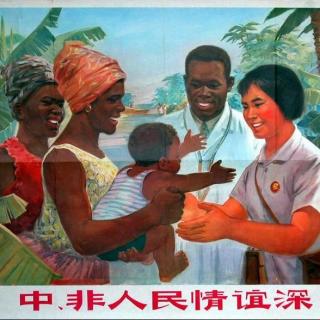
介绍:
Anchor: With the Forum of China and African Cooperation taking place on December 5th, we find out how Africans in China have benefitted from relations between China and their continent. We also look at their aspirations for the coming Summit. Byron Tseng has more.
Africa and China have a historic relationship that had its inception in the TAZARA railway in East Africa built in the 1960s. These relations have progressed to this day where we have 30,000 African students on university scholarships in China, while there are a million Chinese businessmen in Africa. China has also been actively restructuring the economy of Africa by finding places to form Special Economic Zones for manufacturing. China also offers a daring attitude compared to the West by investing in more risky areas, best exemplified by its $6 billion dollar contract in the Democratic Republic of Congo using a "minerals for infrastructure" formula. Kenyan expat Hannah Ryder is the head of policy and partnership at United Nations Development Program China. She has the responsibility of supporting China to cooperate with her home continent. Ryder explains how FOCAC has been helping Africa.
Ryder:
FOCAC is the originator of many of these initiatives right. The commitment to giving scholarships to African students, many have come through FOCAC. In terms of FOCAC delivering results, making this a long term positive relationship, that is something important for FOCAC. That it can lead to real change in terms of business links, government to government links, or those students who studied in China can go and work in the government, and be facilitators, that would also be a great thing.
One such student who has benefitted from these FOCAC initiatives is Tawanda Michael from Zimbabwe. Tawanda studied Electronic and Information Engineering at Beihang University before his current position as Community Manager at Startup Accelerator Beijing Tech Hive. Although Tawanda applaudes China's efforts to enhance trade and education for Africa, he still feels China and FOCAC need to address the number of Africans recieving scholarships in science and technology.
Tawanda:
Unfortunately, I have not seen enough African entrepreneur in tech space, which is surprising because the Chinese government has supported the scholarship of more than, 30,000 African students in china, annually as of 2014. And for the past couple of years, particularly through FOCAC, there has been an increasing number of students that are coming to China, to study engineering and other tech related degrees, which can build up the human capital of Africa. The problems that can be solved by the power of the mobile internet, span several different sectors. In emerging markets like China and Africa, so those go from health, education, agriculture, finance. If African entrepreneurs are able to figure out solutions to these problems, those can be applicable to countries in Africa. So I would like to see more African tech entrepreneurship, yes.
Although Chinese investment in Africa's science and technology still has room for development. Chinese interest in tourism in Africa has boomed, thanks in part to the organization Brand South Africa. Brand South Africa promotes investment and trade to South Africa. Marketing Assistant at Brand South Africa, Gontse Nosi explains his hopes from Chinese investments.
Nosi:
How they can help? It's a little bit about investment, You want to build cars, If china does not have enough space, open up a factory in South Africa, or textile industry. Help the small medium enterprises at home to manufacture in-house, and do well in exporting it. And opening up the trade that could help in terms of made in South Africa products, that can be exported to China.
African expats in China have an important role to play in being the conduits to help transition Africa into an industrialized continent. Moreover, Africans who can understand the Chinese language and culture can negotiate better deals with Chinese partners. This is made more important by the fact that China surpassed America in 2012 to become Africa's largest trading partner. As a result, Tawanda says that he hopes African countries can take more of initiative at the upcoming FOCAC summit.
Tawanda:
What I would like to see are more African governments putting pressure on the Chinese government to facilitate the setting up of businesses. This is true for foreign entrepreneurs, but most importantly people to people collaboration supported by government. We hope for more collaboration is space of scientific and tech development, and to see more Chinese investment.
Ahead of the FOCAC summit in Johannesburg, Ambassador of the Chinese government on African affairs ,Liu Guijin, addressed many concerns for Africa and the African expats of China. One of Liu's pledges was how China would aid Africa in industrialization. He says that Africa can get value-added manufacturing jobs by China moving surplus production capacity to the continent. FOCAC aims to be a Win-Win for China and the 75% of African nations attending the Summit.

